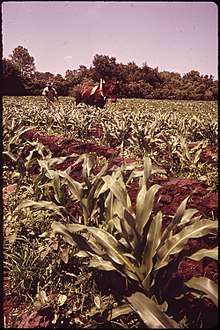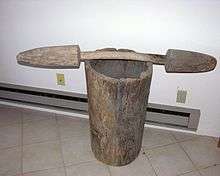Michael Row the Boat Ashore
| "Michael Row the Boat Ashore" | |
|---|---|
| Song |

"Michael, Row the Boat Ashore" (or "Michael Rowed the Boat Ashore", or "Michael, Row Your Boat Ashore", or "Michael Row That Gospel Boat") is a Negro spiritual. It was first noted during the American Civil War at St. Helena Island, one of the Sea Islands of South Carolina.[1] It is cataloged as Roud Folk Song Index No. 11975.
It was sung by former slaves whose owners had abandoned the island before the Union navy arrived to enforce a blockade. Charles Pickard Ware was an abolitionist and Harvard graduate who had come to supervise the plantations on St. Helena Island from 1862 to 1865, and he wrote down the song in music notation as he heard the freedmen sing it. Ware's cousin William Francis Allen reported in 1863 that the former slaves sang the song as they rowed him in a boat across Station Creek.[2]
The song was first published in 1867 in Slave Songs of the United States by Allen, Ware, and Lucy McKim Garrison.[3]
Lyrics
The oldest published version of the song runs in a series of unrhymed couplets:[3]
Michael row de boat ashore, Hallelujah!
Michael boat a gospel boat, Hallelujah!
I wonder where my mudder deh. [there]
See my mudder on de rock gwine home.
On de rock gwine home in Jesus' name.
Michael boat a music boat.
Gabriel blow de trumpet horn.
O you mind your boastin' talk.
Boastin' talk will sink your soul.
Brudder, lend a helpin' hand.
Sister, help for trim dat boat.
Jordan stream is wide and deep.
Jesus stand on t' oder side.
I wonder if my maussa deh.
My fader gone to unknown land.
O de Lord he plant his garden deh.
He raise de fruit for you to eat.
He dat eat shall neber die.
When de riber overflow.
O poor sinner, how you land?
Riber run and darkness comin'.
Sinner row to save your soul.
- or
Michel, row the boat a-shore
Hallelujah!
Then you'll hear the trumpet blow
Hallelujah!
Then you'll hear the trumpet sound,
Hallelujah!
Trumpet sound the world around
Hallelujah!
Trumpet sound the jubilee
Hallelujah!
Trumpet sound for you and me
Hallelujah!
This song originated in oral tradition, and there are many versions of the lyrics. It begins with the refrain, "Michael, row the boat ashore, Hallelujah." The lyrics describe crossing the River Jordan, as in these lines from Pete Seeger's version:
Jordan's river is deep and wide, hallelujah.
Meet my mother on the other side, hallelujah.
Jordan's river is chilly and cold, hallelujah.
Chills the body, but not the soul, hallelujah.[4]
The River Jordan was where Jesus was baptised and can be viewed as a metaphor for deliverance and salvation, but also as the boundary of the Promised Land, death, and the transition to Heaven.[5]
Harry Belafonte sang a rendition on his album Midnight Special which combines elements drawn from Christianity, American slavery, and Civil Rights Movement. The lyrics work their way through different parts of the Biblical narrative before concluding with the following verses: [6]
They nailed Jesus to the Cross, Hallelujah
But his faith was never lost, Hallelujah
So Christian soldiers off to war, Hallelujah
Hold that line in Arkansas, Hallelujah
Michael row the boat ashore, Hallelujah!
Michael row the boat ashore, Hallelujah!
Like Joshua at Jericho, Hallelujah
Alabama's next to go, Hallelujah
So Mississippi kneel and pray, Hallelujah
Some more buses on the way, Hallelujah
Michael row the boat ashore, Hallelujah!
Michael row the boat ashore, Hallelujah!
According to William Francis Allen, the song refers to the Archangel Michael.[7] In the Roman Catholic interpretation of Christian tradition, Michael is often regarded as a psychopomp or conductor of the souls of the dead.[8]
The spiritual was also recorded on Johns Island during the 1960s by American folk musician and musicologist Guy Carawan and his wife, Candie Carawan. Janie Hunter, former singer of the Moving Star Hall singers, noted that her father, son of former slaves, would sing the spiritual when he rowed his boat back to the shore after catching fish.[9]
Row, Michael, Row, Hallelujah,
Row, Michael, Row, Hallelujah,
Row the boat ashore, Hallelujah,
See how we (do) the row, Hallelujah,
See how we the row, Hallelujah,
Let me tries me chance, Hallelujah,
Let me tries me chance, Hallelujah,
Jump in the jolly boat, Hallelujah,
Jump in the jolly boat, Hallelujah,
Just row Michael, row, Hallelujah,
Row the boat ashore, Hallelujah.
(repeated thusly until end)
A similar version was collected by Guy Carawan on an unspecified Sea Island.
- Let me try my chance, Hallelujah,
Let me try my chance, Hallelujah,
Sister Mary try her chance, Hallelujah,
Sister Mary try her chance, Hallelujah,
Just let me try my chance, Hallelujah,
Just let me try my chance, Hallelujah,
Michael row your boat ashore, Hallelujah,
Michael row your boat ashore, Hallelujah,
Sister Mary row your boat, Hallelujah,
Sister Mary row your boat, Hallelujah,
Everybody try a chance, Hallelujah
Everybody try a chance, Hallelujah
Oh just let me try my chance, Hallelujah
Oh just let me try my chance, Hallelujah
(repeated thusly until end)
Recordings
The version of "Michael, Row the Boat Ashore" that is widely known today was adapted by Boston folksinger and teacher Tony Saletan, who taught it to Pete Seeger in 1954.[10][11] Saletan, however, never recorded it. Seeger taught it to the Weavers, who performed it at their 1955 reunion concert.[12] One of the earliest recordings of the song is by folksinger Bob Gibson, who included it on his 1957 Carnegie Concert album.[13] The Weavers included an arrangement in The Weavers' Song Book, published in 1960. Similarly, Seeger included it in his 1961 songbook, American Favorite Ballads, with an attribution to Saletan.[14] The American folk quintet the Highwaymen had a #1 hit in 1961 on both the pop and easy listening charts in the U.S. with their version (under the simpler title of "Michael"), first recorded and released in 1960; this recording also went to #1 in the United Kingdom.[15] Billboard ranked the record as the No. 3 song of 1961.[16]
The Highwaymen version that went to #1 on the Billboard charts had these lyrics:
Michael row the boat ashore, hallelujah.
Michael row the boat ashore, hallelujah.
Sister help to trim the sail, hallelujah.
Sister help to trim the sail, hallelujah.
Michael row the boat ashore, hallelujah.
Michael row the boat ashore, hallelujah.
The River Jordan is chilly and cold, hallelujah.
Chills the body but not the soul, hallelujah.
Michael row the boat ashore, hallelujah.
Michael row the boat ashore, hallelujah.
The river is deep and the river is wide, hallelujah.
Milk and honey on the other side, hallelujah.
Michael row the boat ashore, hallelujah.
Michael row the boat ashore, hallelujah.
The recording begins and ends with one of the singers whistling the tune a cappella, later accompanied by simple instruments, in a slow, ballad style. All the Highwaymen sang and harmonized on the Michael lines but individual singers soloed for each set of additional lyrics. This version differs from the Pete Seeger version by changing "meet my mother on the other side" to "milk and honey on the other side." "Milk and honey" is a phrase used in the Book of Exodus during Moses' vision of the burning bush. The original Negro spiritual mentions the singer's mother but the hit version does not.
Lonnie Donegan reached #6 in the UK Singles Chart with his cover version in 1961. Harry Belafonte recorded a popular version of it for his 1962 Midnight Special album. Pete Seeger included it in his Children's Concert at Town Hall in 1963. The Lennon Sisters recorded a version which was later featured as a bonus track from their album "The Lennon Sisters Sing Great Hits".
Trini Lopez had a minor hit with it in 1964. The Israeli-French singer Rika Zaraï also recorded a French version under the title "Michaël" in 1964.
The African-American gospel/folk duo Joe & Eddie recorded it for their "Walking Down the Line" album in 1965. Later, the song was recorded by The Beach Boys for their 1976 15 Big Ones album but was left off the final running order. Brian Wilson rearranged the song, giving it a rich arrangement with sound similar to the many other covers recorded during this period, including a complex vocal arrangement. Mike Love sang lead vocals. Richard Jon Smith's version spent nine weeks in mid-1979 at #1 in South Africa.[17]
The counselors sing the song, along with "Down in the Valley" in the opening scene of the 1980 horror film, Friday the 13th.
A German version is "Michael, bring dein Boot an Land" by Ronny. A German gospel version is "Hört, wen Jesus glücklich preist" (A song of the Beatitudes). German disco group Dschinghis Khan recorded a version of it in 1981.
The Smothers Brothers did a fairly straightforward version of the song on their album It Must Have Been Something I Said!, before turning it into a comic sing-along on Golden Hits of the Smothers Brothers, Vol. 2 (which is also included on their album Sibling Revelry: The Best of the Smothers Brothers).
Sule Greg Wilson produced a version based upon Allen/Ware/Garrison, as well as Row, Michael Row, by Jane Hunter and Moving Star Hall singers. Featuring Tuscarora vocalist Pura Fé (with Wilson on instruments and background vocals), this version was used for the end credits of The Librarian and the Banjo, Jim Carrier's 2013 film on Dena Epstein, author of the book, Sinful Tunes and Spirituals.
Raffi sings this song on his Bananaphone album.
Peter, Paul and Mary sing this song on their Around the Campfire album.
References
- ↑ William Francis Allen, Charles Pickard Ware, and Lucy McKim Garrison, Slave Songs of the United States, p. xl.
- ↑ Epstein, Dena (2003). Sinful Tunes and Spirituals: Black Folk Music of the Civil War. University of Illinois Press. p. 290. ISBN 0-252-07150-6.
- 1 2 William Francis Allen, Charles Pickard Ware, and Lucy McKim Garrison, Slave Songs of the United States, p. 23.
- ↑ "Michael, Row the Boat Ashore", Pete Seeger Appreciation Page.
- ↑ Gast, Walter E. "Christian Symbols R: River". Symbols in Christian Art and Architecture. Retrieved July 17, 2013.
- ↑ "Harry Belafonte – Michael Row The Boat Ashore Lyrics". LyricsTime.com. Retrieved July 17, 2013.
- ↑ William Francis Allen, Charles Pickard Ware, and Lucy McKim Garrison, Slave Songs of the United States, p. xvi.
- ↑ "St. Michael the Archangel", The Catholic Encyclopedia, 1913.
- ↑ "Moving Hall Star Singers – Row Michael Row". pastemagazine.com. Retrieved June 5, 2017.
- ↑ "Shaker Village Work Group" Shaker Village Work Group#Role in the American folk music revival
- ↑ Seeger, Pete & Bob Reiser (1989). Everybody Says Freedom: A History of the Civil Rights Movement in Songs and Pictures. New York: W.W. Norton. p. 164. ISBN 978-0-393-30604-0.
- ↑ Seeger, Pete & Bob Reiser (1989). Everybody Says Freedom: A History of the Civil Rights Movement in Songs and Pictures. New York: W.W. Norton. p. 164. ISBN 978-0-393-30604-0.
- ↑ Keefer, Jane. "Folk Music Index". Folk Music – An Index to Recorded and Print Resources. iBiblio. Retrieved June 4, 2017.
- ↑ Seeger, Pete (1961). Irwin Silber & Ethel Raim, eds. American Favorite Ballads: Tunes and Songs as Sung by Pete Seeger. New York, NY: Oak Publications. p. 75. OCLC 894933338. Retrieved January 2, 2018.
- ↑ "The Highwaymen: Biography", AllMusic.
- ↑ Billboard Year-End Hot 100 singles of 1961
- ↑ Samson, John; Chris Kimberly (November 2000). "South African Rock Lists Website – Number of No.1's on the SA Charts". SA Rock Encyclopedia. Retrieved July 17, 2013.
External links
- Audio sample of the song performed by the German choir Outta Limits
- Free MP3 Download for use in services performed by Richard Irwin
